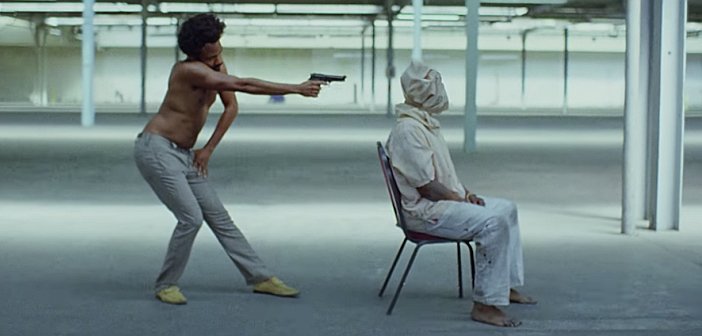This is America isn’t a wake-up call, because nothing is. Not the killer cops, not the mass shootings of children by other children, not the incipient fascism in the White House. Nothing.
Source: Medium (see more by Kianya Harrison here)
I woke up on Sunday morning to see #ThisIsAmerica trending, and clicked through to find Childish Gambino’s new music video on YouTube. The first viewing reinforced my thoughts on Donald Glover (aka Childish Gambino): He’s carving out a unique place for himself in American popular culture — a place that’s difficult to define because it’s somewhere between commercial success and subversion. This is America is an indictment of a gun-crazed, violent society. It’s also a commentary on Black American entertainers’ role in perpetuating, glamorizing, and covering for the sins of their nation.
This is America is a musical — the song and the visuals can’t really be separated. Director Hiro Murai understands the language of cinema, and this short film is carefully crafted.
The action doesn’t really start until Glover takes a highly stylized pose that evokes (how deliberately, I don’t know) the posture seen in old Jim Crow posters and shoots a handcuffed, hooded prisoner in the back of the head. A boy takes the gun from him to dispose of it, and two others begin to drag away the body. Glover, the star of this show, represents himself as a murderer, as complicit — he is America. And, I suppose that’s his choice to make, but, most notably, This is America contains no White perpetrators. Even when the Charleston massacre is crudely re-enacted, it is Glover who pulls the trigger. Why? Why name it “This is America” without some clear representation of White supremacist violence? There are hints of police brutality sprinkled throughout the video, but never in the foreground. Why were these choices made?
Donald Glover has navigated Hollywood too well not to understand the White gaze. He knows how to make White America feel comfortable. And he knows just how far to push when poking at its failings. He also knows how to make Black people uncomfortable instead by highlighting Black trauma and the pathologies that plague Black communities.
But I don’t know that having a Black man pull the trigger in the video is that simple.

“This is America. Don’t catch me slipping, now,” Glover raps.
Don’t catch me slipping. There’s always a way to make Black people’s suffering seem like our own fault, no matter how targeted or deliberate the attacks against us are. If you get got, it’s because you and your people got caught slipping. There’s a reason headlines make it seem like cops’ bullets fire themselves. Even their guns get the benefit of the doubt; Black people shot full of holes don’t.
The narrative that Black America is solely responsible for all the violence it suffers is centuries-old and extremely resilient. This is where Kanye West’s statements about slavery being a choice find their roots. It’s more palatable to blame the victims than force the perpetrators to take a posture of forgiveness, and this upside-down world is what Black Americans have to negotiate without losing their minds. As he dances through the frame, Glover goes from grimacing to grinning in split seconds, from brutal violence to almost shucking and jiving. He skillfully navigates the madness and chaos unfolding behind him. At the end, he’s sweaty, wide-eyed, and running for his life.
This is America, where Blackness is pathologized and capitalism warps ghastly incentives even further. Black people in America have been selected to be the lowest rung, the exploited class upon which the nation’s wealth is built. It’s no accident that Black entertainment has become one of the primary vehicles for masking this reality. There’s a reason the gaudy exhibitions of “new Black money” are reliably programmed.
When the choir raises their voices to sing, “Grandma told me, ‘Get your money, Black man!’” I can’t tell if it’s a cry for reparations or a call to dive headfirst into the rapacious, winner-take-all capitalism of America’s streets and boardrooms. And while I’m not convinced that this uncertainty isn’t deliberate (a slippery way of not alienating anyone), that tension is at the heart of the truth Glover is telling. Survival demands that Black people participate in an immoral, capitalist system that brutalizes them, and justice demands the wealth built on the backs of our stolen ancestors be returned to us. We try to achieve both and end up accomplishing neither.
As Glover and his crew of teenage backup dancers nail the latest dance crazes, we watch them and not the surrounding bedlam — and that’s the point. We’ve been anaesthetized. This is America isn’t a wake-up call, because nothing is. Not the killer cops, not the mass shootings of children by other children, not the incipient fascism in the White House. Nothing. It’s just ever-devolving turmoil with seemingly no end in sight, and all we can do is watch the people singing, rapping and dancing in the foreground.
This is America.
By Kitanya Harrison. See more by her on Medium . She also writes speculative Sherlock Holmes novels under the pseudonym, Harrison Kitteridge | http://amzn.to/28Qfcy0
